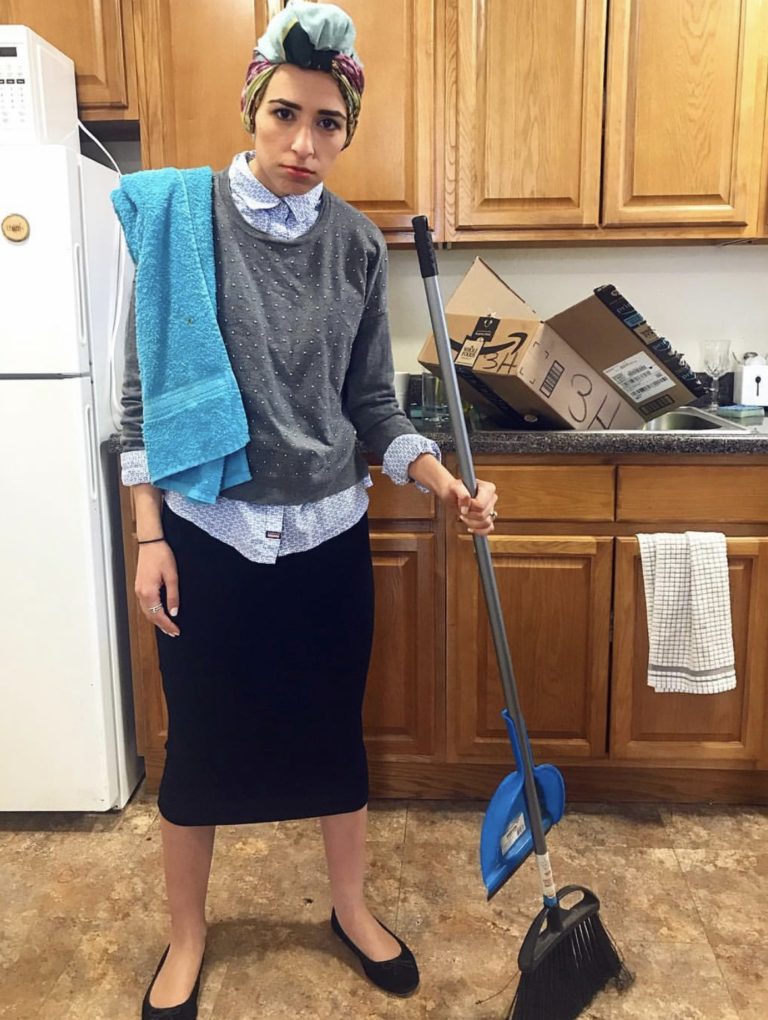
They say women aren’t competitive, but in my extended family, Pesach preparation was a grueling ultra-marathon. As the menorah was being carefully placed on a table covered with silver foil by the window in mid-December, some of my aunts had already begun their Pesach prep. These women meant business. As winter storms raged outside, they ruthlessly flipped mattresses and tacked eyelet edging on freshly cleaned linen closet shelves.
After careful inspection of the Pesach boxes, the shopping would begin. Mid-Teves was for knives, glasses, pots, and containers, late Shevat or early Adar for dry goods and meat, and vegetables, fruit, and dairy would arrive a full two weeks before the holiday, on Rosh Chodesh Nisan. Some of the aunts were lucky and had separate Pesach kitchens. The others made do with plug-in portable stoves, large hulking freezers, and a designated countertop which was covered in several layers of contact paper, silver foil, and even linoleum.
These women meant business. As winter storms raged outside, they ruthlessly flipped mattresses and tacked eyelet edging on freshly cleaned linen closet shelves.
They wore grim expressions as they purged dust from their already pristine homes. Chandeliers were lowered and each crystal cleaned. They used strange combinations of toothpicks and Q-tips to clean light switch covers, telephones, and sink and stove corners. The backs of toilets, behind the refrigerator, washing machine, and dryer, and the dark places of the home where no one ever really goes were all exposed, swept, washed, and covered up again. The menfolk stayed away as much as possible. Their homes were undergoing some severe reorganization, and their main contribution was brawn to move things. They did not understand the process and why it meant so much to their wives. When they would eat their snacks while walking, the wrath and fury of a woman who has done too much in a compressed time would fall upon them. Wisely, they stayed away until late, when she was tired, and only needed them to throw out the inevitable 15 black garbage bags or move the cans to the curb.
When I would read the megillah on Purim and get to Chapter 4, where Mordechai, dressed in sackcloth, exhorts Esther to visit King Achashverosh, and she demurs and asks if it really needs to be right then and there, I know where she is coming from. It was just before Pesach, and I know we, as her sisters, also ask, “Can’t this wait until after Pesach?”
The hustle and bustle of the homes, with the children forced to play outside so that the houses could be readied and the crumbs of chametz removed, are seared into my cousins’ and my memories. There was an intense competitiveness about who could be ready first, with varying levels of readiness all demonstrating Superior Balaboosta Skills. Most of the women had gotten Level 1 cleanliness down by Rosh Chodesh Nisan. This meant no crumb had survived the onslaught of Windex, Pinesol, Clorox, and Pledge. The vacuums had been wielded over wood, marble, carpet, and upholstery. Swiffers? Blind cleaning? Chandeliers? Check, check, and check.
Level 2 was having the Pesach food all organized and put away into cupboards—not lying around in the cardboard boxes from the grocery store. Level 3 was the starting of the cooking, with demonstrable results in beet-stained hands, some bandages on the index finger or thumb, and a freezer full of aluminum 9×13s which were labeled and placed in 2 gallon size Ziploc bags. Level 4 was when the seder table was set a full week beforehand with an extra-large disposable plastic cloth, draped on top and taped down with fat blue painter’s tape to keep it secure.
Only one aunt ever got to level 4. Everyone hated her.
I think about my aunts and the physical and emotional toll the competitive frenzy took on them. If my mind wanders to Pesach during Chanukah time, I resist the urge to clean the drawers in my kids’ bedrooms. I do my cleaning and cooking, not as a competitive sport, not with grim determination, but with joy of the holiday. I don’t redo my linen closet, reorganize the laundry room, open books that haven’t been opened all year, or make myself crazy.
Only one aunt ever got to level 4. Everyone hated her.
Pre-Pesach cleaning is to get rid of chametz, the leavened foods that are forbidden during this holiday. Competitiveness is also a type of chametz, artificially raising one’s stature and sense of self (I am so ahead of her!).
Pesach is a holiday. The word holiday is made up of the words “holy” and “day”. If there is a spirit of competitiveness, provocation, and making another person feel bad that they can’t keep up, how can this be in the spirit of holiness? Women are known as the Akeret HaBayit, the mainstay or the bedrock of the home. The home is the perfect place for holidays, and a home full of anticipation, warmth, and gladness bring holiness into it.
May we be blessed that our homes be readied for the holidays with the removal of chametz—both literal and spiritual.